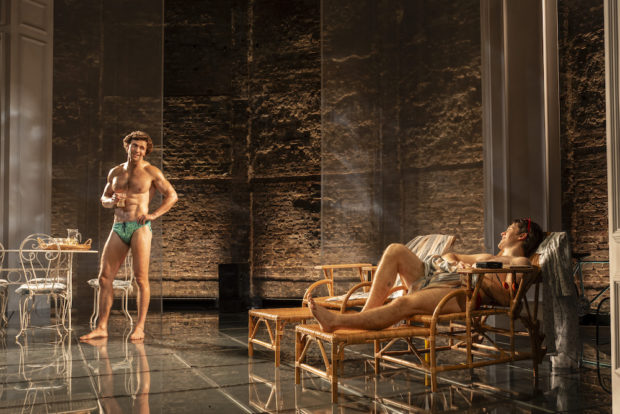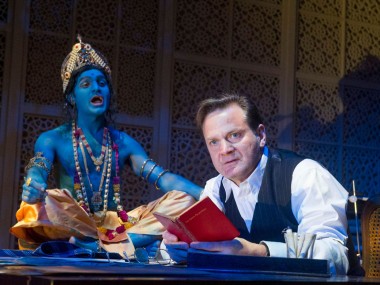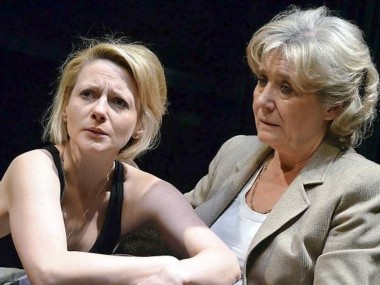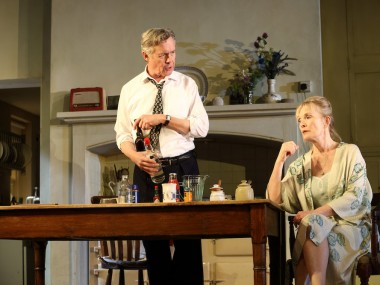The Line of Beauty, Almeida Theatre
Thursday 30th October 2025

Thatcher, and the image of Thatcher’s Britain, continues to cast a long shadow over contemporary culture. So it’s hardly a surprise that the most audience-pleasing moment in playwright Jack Holden’s stage adaptation of The Line of Beauty, Alan Hollinghurst’s 2004 Man Booker Prize-winning novel, is when the central character, the symbolically named Nick Guest, dances with the Iron Lady, resplendent in blue, an “impossible colour” which he thinks symbolizes the “aesthetic poverty” of Conservatism. As imagined by director Michael Grandage, the episode is delivered with both subtlety and beauty.
Nick is an Oxford university graduate whose PhD research is on the American novelist Henry James, and Hollinghurst’s story nods to the moral temper of the master in its depiction of Thatcher’s Britain as a place riddled with homophobia, hypocrisy and class hatred. As he moves up the social scale into the imposing Notting Hill home of his uni friend Toby Fedden, his pursuit of beauty is both aesthetic and sexual. Homosexual. And in the context of the 1980s, secretive. He can’t come out to Toby’s father, a newly elected Tory MP and his classy wife Rachel, although their troubled daughter Cat understands him, and encourages his relationship with Leo, a young black man who works for the leftwing Camden Council.
Spanning the years 1983 to 1987, this adaptation follows the original story closely as Nick enters a world of money, power and privilege, especially after meeting Wani, the wealthy, closeted Lebanese gay from a powerful family. Together they create a magazine dedicated to the beautiful arts, whose title Ogee refers to William Hogarth’s 1753 treatise, The Analysis of Beauty, and the perfectly curved s-shaped line not only of artistic images, but also of desirable human bodies. But while Nick, whose opinions of William Holman Hunt’s The Shadow of Death and the differences between baroque and rococo are artfully rendered, claims that “the line of beauty” led him to Wani, it is also the lure of money that, however unconsciously, draws him into these privileged circles.
The tragedy at the heart of the story is that Nick does not realize, until it is too late, that the rich and powerful, here represented especially by the brutally homophobic Badger, a family friend of the Feddens, will never accept him. He is not “one of us” — and his sexuality also makes him an outsider. All this happens at a time when HIV-AIDS is a new pandemic which affects especially, although not exclusively, the gay community. The deep fears and deep sadness of this terrible disease leads to a moment of rare emotional expressivity in what is quite a cool and constrained social group. The English upper classes don’t really do emotion, which gives this play a kind of chilly veneer. The great exception to this is Cat, whose experience of self-harm and bipolarity provides an implied criticism of a world based on deception in both public office and personal relations.
Apart from beauty, the other lines in the play are those of cocaine, and the drug-fuelled parties of these Oxford graduates merge with a variety of disco adventures in pubs and clubs such as Heaven, as electronic pop music throbs in the background. This makes the ideas in play — which question, as Henry James did, the easy equation of beauty with goodness — especially palatable, with Cat, ironically perhaps, emerging as the most lucid and intelligent member of the whole family. It is she who tells Nick: “People are beautiful because we love them, not the other way around.” But the tragedy is that money triumphs over affection, and when things go wrong money also needs scapegoats.
Holden’s faithful adaptation is very good in terms of storytelling, and Grandage’s directing is unflashy and extremely well focused. Designer Christopher Oram’s set is suitably elegant, with grey and white the background for a sparse sprinkling of rich furniture. Unlike the 2006 BBC television version, written by Andrew Davies and starring Dan Stevens, the 1980s vibe is not emphasized here, and there’s no sense of nostalgia for a world where discrete dating required classified adverts in a magazine. As far as acting is concerned this is very much an ensemble piece, except for Nick who is played by rising star Jasper Talbot with a nice touch of charming awkwardness that turns into unfeeling ambition.
The rest of the cast circle this doomed fixed point: Charles Edwards and Claudia Harrison are convincing as the older Feddens, so English and so friendly until their masks slip, while Leo Suter and Ellie Bamber are likewise excellent as their children, the confident Toby and the energetically erratic Cat. Alistair Nwachukwu’s attractive Leo has a bigger and better part than his mother (Doreene Blackstock) and sister (Francesca Amewudah-Rivers), who nevertheless delivers a crucial emotional punch. Arty Froushan’s smoothly passionate Wani provides a fine contrast to Robert Portal’s aggressive Badger. The Line of Beauty is a subtle and appealing adaptation of a modern classic.
This review first appeared on The Theatre Times



